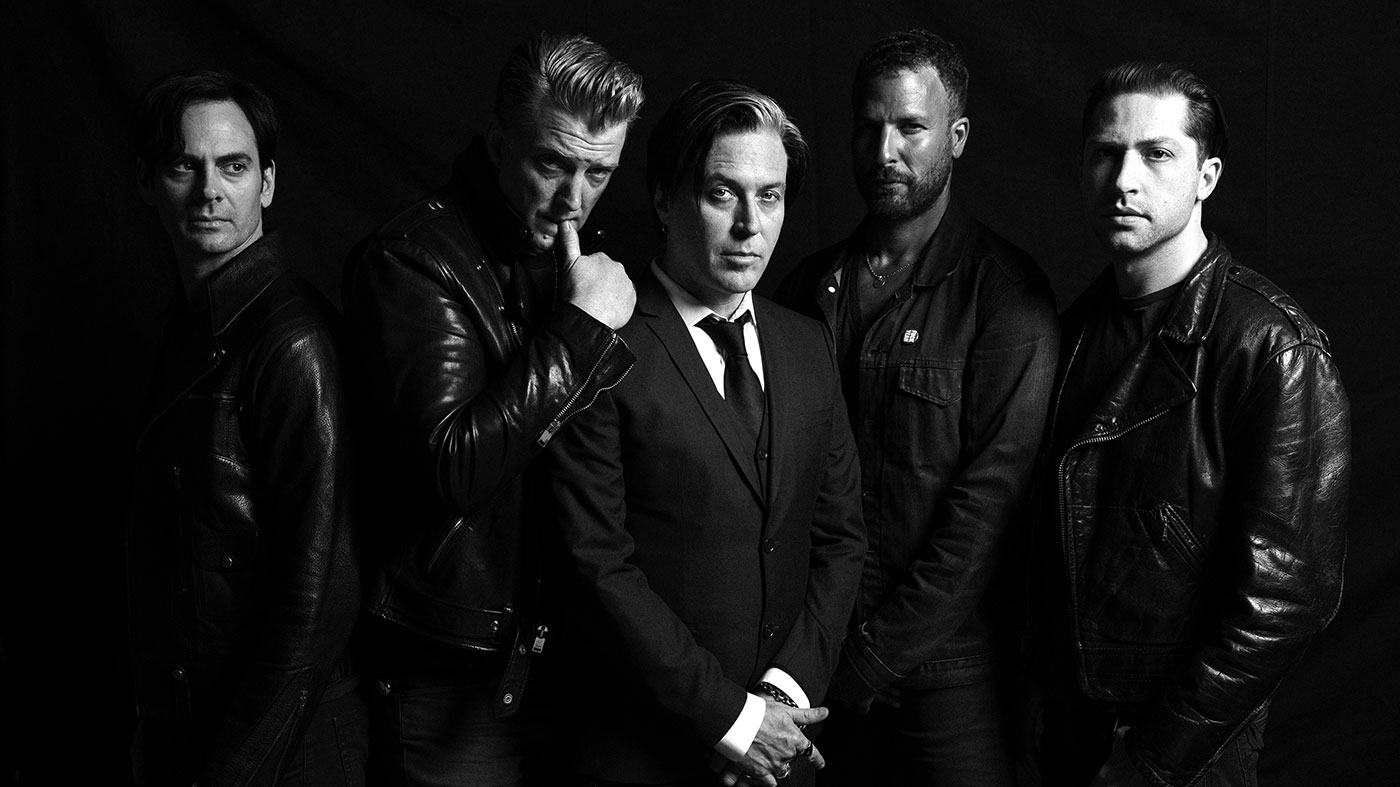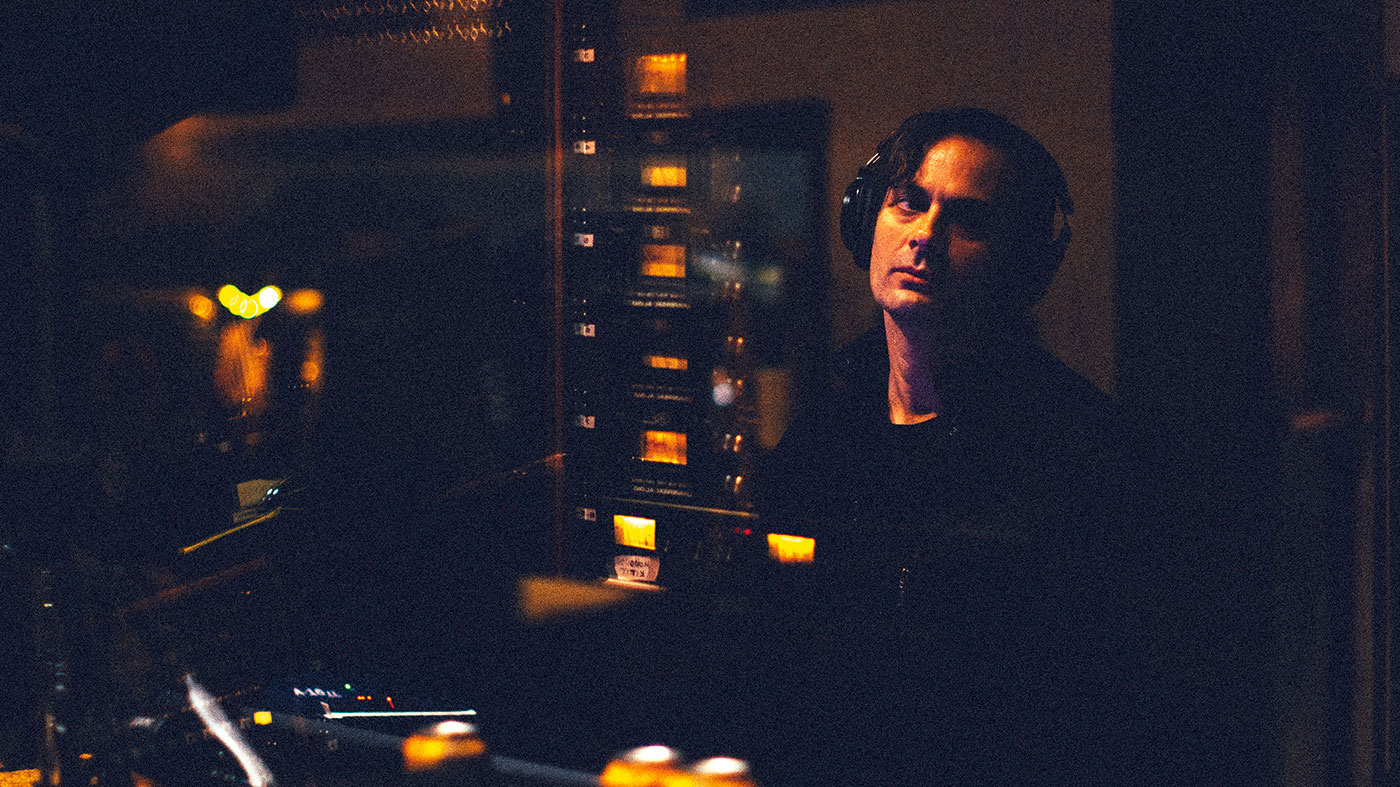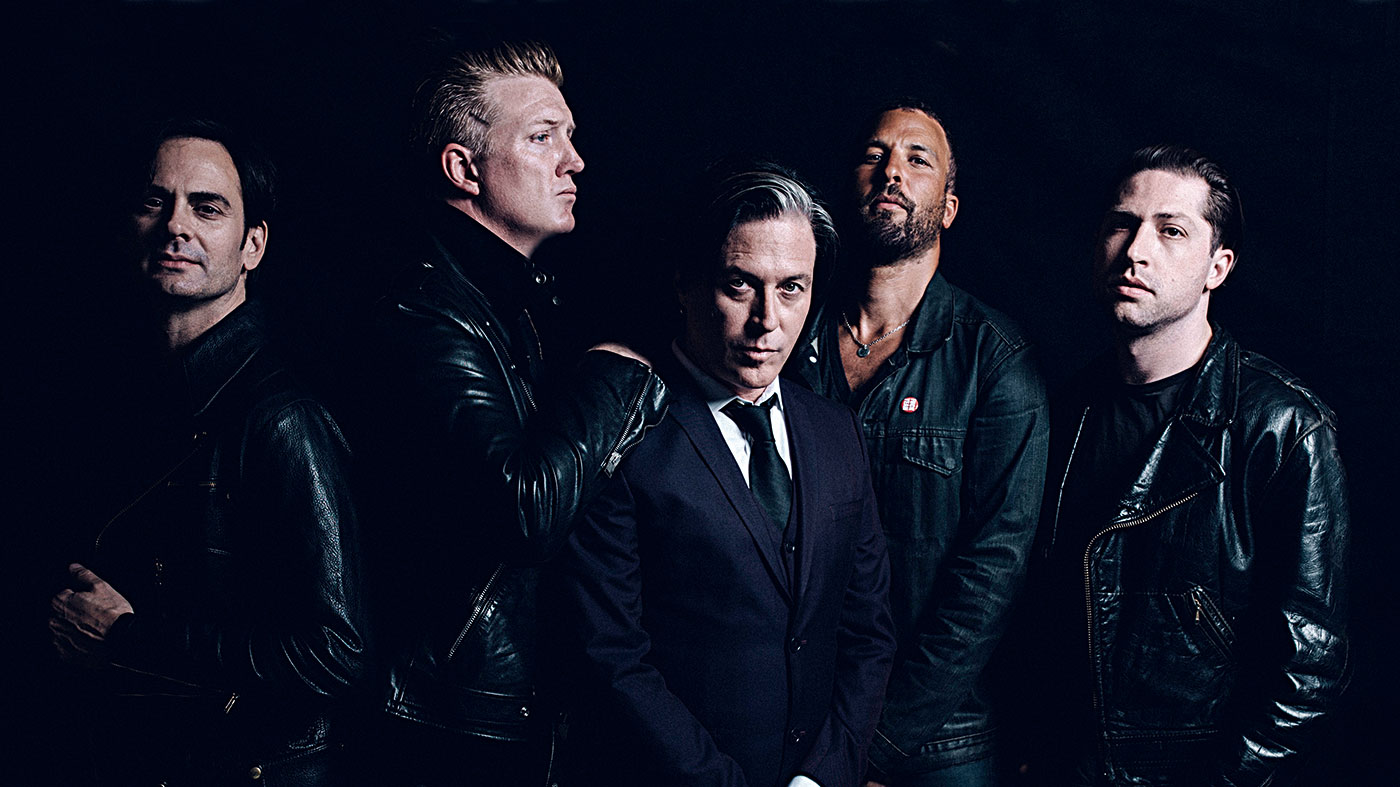Queens Of The Stone Age: "Experimenting is the most important thing you can do as a musician"
Dean Fertita and Troy Van Leeuwen talk Villains, Iggy Pop and the power of three guitarists

Ever since emerging from the white heat of Palm Desert, California, in 1996, Queens Of The Stone Age have specialised in a brand of rock ’n’ roll with a fugitive charm.
Theirs is a sound of contrasts, oscillating between hypnotic, celebratory rock groove and wry melancholy. Frontman and guitarist Josh Homme’s faux falsetto vocals snake their way around skronky guitar and synths. The rhythm, courtesy of bassist Michael Shuman and drummer Jon Theodore, is almost always propulsive.
Queens make party music for dark times and Villains looks to expel the latter with a little of the former. Inspired by Wendy Carlos’ soundtrack work on Stanley Kubrick films such as A Clockwork Orange, Villains sees guitarist and keyboardist Dean Fertita go heavy on the synths.
In concert with Homme and Fertita, Troy Van Leeuwen’s guitar ‘shoots the gaps’ harmonically. Under the watchful eye of producer Mark Ronson, a leftfield appointment that worked out perfectly, Villains mixes T-Rex-style glam-rock, post-punk, and new wave without ever sounding like anyone else.
Fertita and Van Leeuwen tells us how it all went down.
How did this record first come together?
Dean Fertita: “What we wanted to do was create a working environment that would be a lot different from the last one. I think it is pretty well documented but Josh was going through a lot of heavy emotional stuff last time, so we just got in a room together and started writing. Josh had a bunch of ideas already started and we all emptied our pockets on the table with things that we had and that was it. Off to the races!”
Want all the hottest music and gear news, reviews, deals, features and more, direct to your inbox? Sign up here.
Troy Van Leeuwen: “We always have music in process. We really wanted to get together as a band and just go in a room and play, listen to each other and see what everyone’s doing.”
So you’d just have these little ideas, riffs, melodies, a rhythm, and build on top of it?
Repeating ourselves is kind of bad. I mean we can’t ever do it. If we do, I mean, that’s pretty much the end of creativity for us
Troy: “Sure, usually there is. We really focused on songs, more than anything. Before there’s words or anything there’s just melodies and rhythmic and melodic material to start with. As long as those things are there, usually we can build on those elements.”
Dean: “We just kept going until Mark [Ronson, producer] told us to stop. We just all stayed in the room together until we had enough songs that we felt excited about and that were making a statement, that they were a little bit different from the last one.”
Troy: “Yeah, that’s definitely a philosophy of ours. Repeating ourselves is kind of bad. I mean we can’t ever do it. If we do, I mean, that’s pretty much the end of creativity for us, so we definitely wanted to build a bridge from the last record to where we’re heading and then burn the bridge, and then just never look back and go and be our future selves.”
Did having Mark Ronson produce the record help with that?
Dean: “Mark tried to capture the truest version of us that he could. He’s familiar with Queens; he could look at it as a fan. He was really great at keeping us from getting away from ourselves too much.”
Troy: “Arrangements-wise, there were little bits that Mark would add if we were stuck. He really was like the best definition of a producer. Having him on this record was an attempt to do something different. I feel like we’re peanut butter to his chocolate. Everybody loves Reese’s Peanut Butter Cups. That’s what we wanted, Reese’s Peanut Butter Cups.”
Was it always your intention to make a more up-tempo, danceable record?
Dean: “That just sort of evolved through the songs that we had. Queens always had that element. I guess the only thing that was conscious was that we wanted to really push that to the forefront. But there’s nothing about it that hasn’t always existed as part of who Queens are. We just went through a different filter this time.”
Troy: “When you think about rock ’n’ roll and where it comes from - even pre-rock ’n’ roll - you think swing music, you think of early jazz, Duke Ellington and Cab Calloway, taking their music and going into the 50s where you’ve got Elvis, Chuck Berry, it was always designed to make people dance, to get people up and out of their seats.”
Feet Don’t Fail Me is a great opener. Didn’t that come from the sessions you worked on for Iggy Pop’s Post Pop Depression?
It’s lifechanging to play with one of your heroes, but when your hero is still making it happen and cutting loose? Iggy Pop bleeds it
Dean: “Some of the music for that was written as an eventual song that would have been on that record, so in brainstorming and throwing all of our ideas on the table for the Queens’ record that found new life and it became a Queens’ song. It has the subtle complexities in there to make it really different and a great track.”
What was working and touring with Iggy Pop like?
Troy: “A lot of rock ’n’ roll musicians have passed away. The last two years have been devastating. I look at Iggy, and think, ‘God, this guy (out of all of them) should have been dead a long time ago.’ He’s still here doing what he does. That, to me, is the most inspiring thing. I mean, of course, it’s life-changing to play with one of your heroes, but when your hero is still making it happen and cutting loose? He bleeds it. He stagedives still. He’s still doing it.”
Dean: “That experience of working with him will probably affect me in ways that I don’t know how to articulate for years. It was this crazy short time period that we had for writing and recording that record, and then the two months of touring. Every little thing was heightened. When we were done with that… within two weeks we knew we had to get in with Queens and start writing. It really started the motor for this record. And I don’t know if we could consciously say why or what it is but it’s more the experience of renewing a love for playing and making music.”

Having played in a number of projects, no two alike, how does that inform your playing?
Troy: “First of all, I think it’s healthy. Second of all, you learn something about someone else and their chemistry, and you have to jive with it so you are already making a change by doing that and you then, in turn, learn something about yourself - those experiences are golden.”
Dean: “It’s totally different and the biggest difference is there are three guys playing. With Dead Weather it’s me and sometimes Jack [White] will play guitar too but, yeah, there’s a lot of room to fill up. With this I try to find the smallest space and meaningful moments. I’m more reactionary in Queens.”
More call and response…
Dean: “Yeah, totally, it’s call and response constantly in this band. It’s probably the most joyful part of writing. You’re always in support of one another and looking for ways to amplify the idea and make it unique.”
With three guitarists, how do you work out who plays what?
We all listen to each other and we are all there to serve the song. Those are two key elements to having three guitar players
Troy: “We all listen to each other and we are all there to serve the song. Those are two key elements to having three guitar players. Dean and I, we usually try to shoot the gaps or do something harmonically that fits with what Josh’s doing. Sometimes, the best thing to do is to not play. Sometimes it’s even better to pick up a synth and add that texture. Frequency-wise, there’s not much room when it comes to guitar when you’re mixing a record, so you’ve definitely got to make it count.”
Dean: “You don’t want to be redundant. It’s all about finding space. I’ve grown to become more of a keyboard player these past few years. Having grown up mostly as a guitar player it has helped me view that instrument a little bit differently - especially from a tone standpoint. It’s a tricky game about finding the correct balance without pushing something that doesn’t need to be there.”

Does that affect your gear choices?
Dean: We really wanted to make a record where all the instruments were very present, really up front. The best way to do that was to make the sound smaller so it is not taking up as much space and you can really put them at the forefront. It was maybe about putting an emphasis on finding wiry, cleaner guitar sounds.”
Troy: “It sounds a little biased but I really did use my signature Jazzmaster a lot. That was the one. In the Queens guitar frequency structure, my zone really is that angular, wiry single-coil sound, that surf guitar sound.”
What else did you use on the record?
Troy: “We used a lot of direct guitar. In a combination with an amp there’d always be a DI that’s kind of dirtied up. A DI guitar is just right there, it’s present, it’s in your face. I used this amp by my friend Gabriel [Currie], who has a company called Echopark. He has this amp that’s called a Vibromatic, and it’s really clean and loud, and just really does something special. It’s not a Fender or a Vox. It’s not a Marshall. It’s its own thing.”
Dean: “I used this [Spontaneous Audio] Son Of Kong pedal on the direct side of the tone, and then a lot of small amps, a lot of small 10" speakers, little Peaveys and things like that. As far as guitars go, I didn’t use a vast array. Most of them were Echopark.”
And presumably there were a few more pedals involved too?
Troy: “Our effects cabinet is just obscene. It’s out of control. I use compression a lot for this record. Instead of overdriving the amp I would be compressing it, that way the gain turns into volume and not just distortion, so it still stays clean. I used a Way Huge [Saffron Squeeze] for that.
“I designed a couple of pedals with a company called Dr No. One of them is called the Raven; it’s a filter. It’s almost like a wah pedal without the pedal. You dial the wah frequency with a knob. That was another tool to shoot the gaps in frequencies that were missing guitar-wise. There’s an octave fuzz.
Experimenting is probably the most important thing you can do as a musician. Actually, recording your experiments is even more important
“The other pedal that was really useful for me was the Eventide H9 [Harmonizer] pedal. There’s also the EarthQuaker Rainbow Machine [a polyphonic pitch shifter]. Usually, that pedal is so outlandish that people don’t know what to do with it, but I have one setting that works. I could keep going…”
Dean: “I use those Moog pedals quite a bit, like the Moogerfooger. A lot of the Moog pedals were a staple for me. Then there’s the usual: POG, Electro- Harmonix pedals. I like the Holiest Grail pedal. And the Electro-Harmonix Polychorus, I used that quite a lot.”
You have both talked about how much you have learnt from working with Iggy Pop. What advice would you pass on to the next generation of guitar players?
Troy: “I believe that experimenting is probably the most important thing you can do as a musician. Actually, recording your experiments is even more important because that way you have a reference for it, and you never know when you look back to things that you were doing as you were experimenting. You can always find something.”
Dean: “What I’ve come to learn over the years is that, actually, it’s best not to listen to anybody. To be able to do that takes time, to accumulate all this knowledge and learn by imitating people on record and by trying to do the complete opposite, then I really think it comes down to identifying your personal expression, and the best way to do that is to just get away from any outside influences.”
Villains is out now. Queens Of The Stone Age tour the UK in November.

Jonathan Horsley has been writing about guitars and guitar culture since 2005, playing them since 1990, and regularly contributes to MusicRadar, Total Guitar and Guitar World. He uses Jazz III nylon picks, 10s during the week, 9s at the weekend, and shamefully still struggles with rhythm figure one of Van Halen’s Panama.


